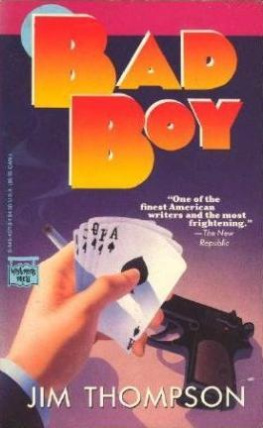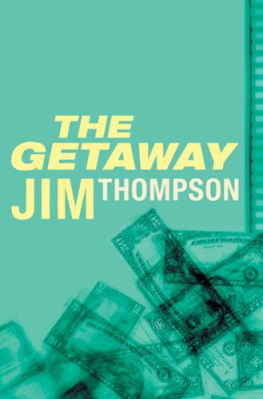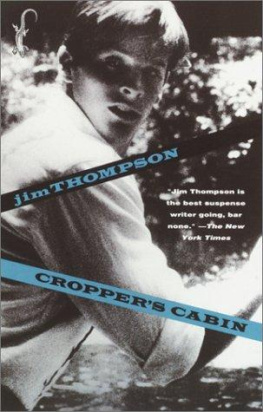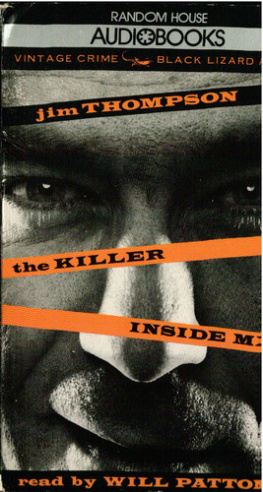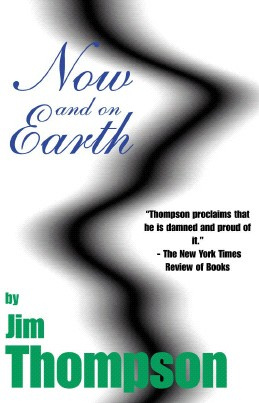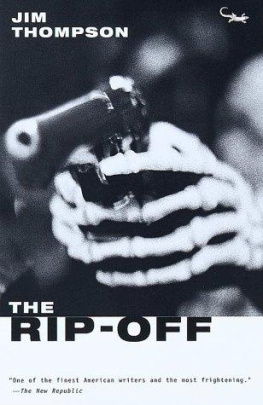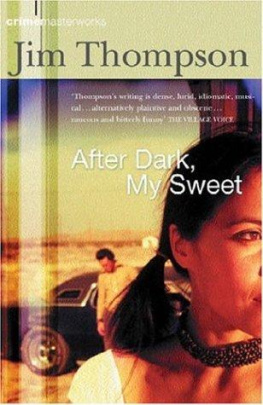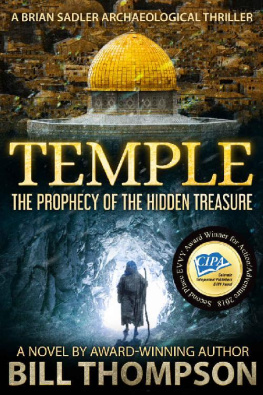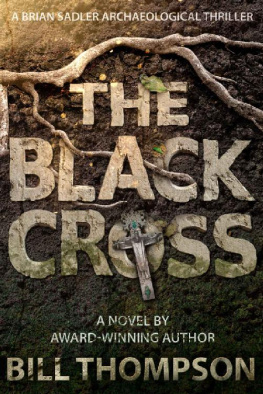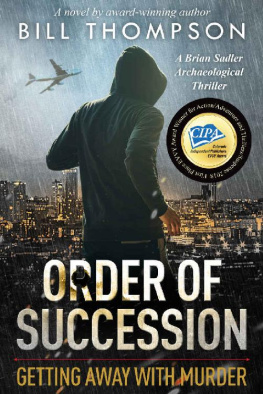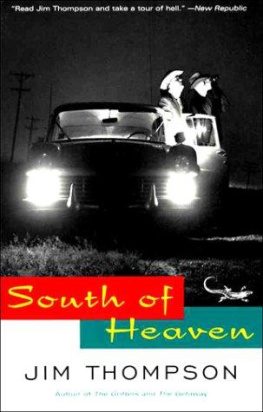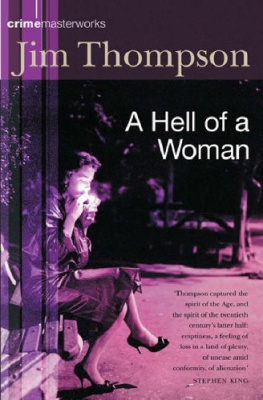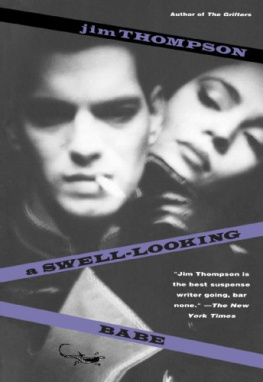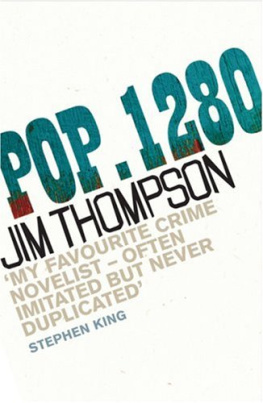My earliest recollections arc of being pinched. Not in the figurative sense, but actually. I was an awkward, large-headed tot, much prone to stuttering and stumbling over my own feet. My sister Maxine, though somewhat my junior, was quick-moving, quick-thinking, glib and extremely agile. When my actions and appearance irritated her-and they seemed to almost constantly-she pinched me. When I failed to respond quickly enough to her commands, she pinched me. The metaphor, "as smooth as a baby's skin," has always been meaningless to me. My infant hide appeared to have been stippled with a set of coal tongs.
One day, shortly after the Thompson family fortunes had undergone an unusually terrifying nosedive and we had moved into a particularly execrable section of Oklahoma City, Maxine spotted two Negro children returning home from the grocery. They had a large bottle of milk with them. Bringing me up from the steps with a quick pinch, Maxine dragged me out to the sidewalk and accosted the two youngsters.
Would they like to be white? she inquired. Well, in return for their milk, she would perform the transfiguration. She had done the trick for me, and I had been blacker than they were. Much, much blacker and now just look at me.
The tots were a little dubious, but, being pinched, I loudly swore to Maxine's tale. And, being pinched again, I hurried into the kitchen and got the implements-a bar of soap and a scrubbing brush-with which the transformation was to be effected. At Maxine's instigation, I took the patients out to the back-yard water hydrant, and began scrubbing them. Maxine took their milk into the privy (it was that kind of neighborhood), drank all she could hold, then dropped the bottle down the hole.
Emerging, she entered the house, beginning to scream with horror as soon as she had got through the door. Mom came running out, Maxine in the vanguard. Pretending to pull me away from the puzzled Negroes, she got in several energetic pinches, making me howlingly incoherent by the time Mom reached the scene. She gave the tots the price of a fresh quart of milk, wiped them off and dragged me into the house, declaring that she didn't know what she was going to do with me. Snickering hideously, Maxine remained in the yard, free to go about her devilish designs.
Being very young, I was unable to explain the affair within the time that it would have done any good to explain. I got an impression from it, however, very nebulous, then, but one that expanded and jelled later.
I was going to catch hell no matter what I did. I might as well try to enjoy myself.
I was always a sucker for friendship. Anyone who spoke a friendly word to me could have the Buster Brown blouse which I customarily wore. In my earlier years, my father traveled considerably about Oklahoma, seldom staying in any town more than a month-not long enough for me to become accustomed to a strange school, yet too long for me to lay out. Just about the time I began to get acquainted, we would pull up stakes.
So I hungered for friendliness, and no matter how many times I was duped I never ceased to bite on the bait that was put in front of me. There was a game called "pushover" in those days. A boy would come up to you, put his arm around your shoulder and engage you in kindly conversation. Then, just when you were beginning to warm up to him, another boy would kneel behind you, the first would give you a push, and you would fall backwards on your head.
I don't know how many times I fell for this game, and similar ones, before I began to get the idea that what appeared to be friendship might be something else entirely. I never liked the idea, and I fought against it. In later life, more or less as a duty, I would draw back from a proffered kindliness and coldly demand the reason for it.
In time, my father settled more or less permanently in Oklahoma City where he became the law partner of Logan Billingsley, brother of Sherman, the Stork Club proprietor. In the early days of Oklahoma, Pop had been a peace officer, and had saved Logan from being lynched. I know nothing about the merits of the case, but I do know that they became close friends and later partners.
Logan had a son named Glenn, a more mischievous brat than which never lived. I understand that he is now running a swank restaurant in Hollywood, but that has nothing to do with this story.
Glenn led a charmed life. One Saturday afternoon when he was leaning out the office window, he fell out. But he survived the four- story fall with no more than a scratch. He landed on the awning of the street-level drug store, went on through it, and dropped into a baby carriage. The vehicle was empty of its occupant, fortunately, for he made a wreck of it. But, as I say, he wasn't hurt a bit.
We lived over in the west end of town, in the vicinity of the Willard school, and a very tough section it was in those days. I came home nightly with large chunks missing from my person and attire. Glenn came in always whole and happy, and usually bearing a quantity of valuables which had had other owners that morning.
One morning a bunch of older boys dropped him down a manhole and sealed the lid back on. Most lads in such a situation would have perished of fright, but not Glenn. He wandered around through the various arteries of the sewer, picking up a sizeable quantity of small change from the silt along his way. After a few profitable hours of this, he made his way out through another manhole. He then phoned the police, quoting that a friend of his had been thrown into a sewer by a certain group of boys-he gave their names. Then, without giving his own name, he hung up and went into town.
The cops collared the youths at school and readily wrung a confession from them. The victim was identified as Glenn. A search of the sewer was begun for his body and the young criminals were taken to the police station, facing a long stretch in the reformatory.
Late in the afternoon, Glenn put in his appearance and was hailed by the admiring and relieved police as a hero. They brought him home where he was tucked into bed, apparently too shocked by his experience to eat. Actually, there was nothing wrong with him but a stomach-ache and, perhaps, eye strain. He had visited four picture shows and eaten several dollars' worth of candy, ice cream and other delicacies.
After that experience the worst toughs at school shied away from Glenn. He was pure poison.
I always admired him.
Logan moved on to New York and greener pastures, and Pop became associated with another attorney, Tom Connors. Tom had been quite a famous man, and he still was a topnotch lawyer when he was sober. He was a good shot and never without a pair of ivory- handled forty-fives given him by the bandit, Pancho Villa.
With two children and another on the way, Pop was becoming a little worried about the future. So, as a backlog against the uncertainties of the law business, he bought a small neighborhood grocery store in the east side of Oklahoma City. He was out of town much of the time, so it was up to Mom and us kids to look after the store.
There was a large garden in the back yard, and also a pear orchard. Our living quarters were in the rear of the store. With free rent and free vegetables and fruit and a small steady business, it looked like we had the financial problem licked.
In this, we figured without Tom Connors.
He came out from the office one summer afternoon when Pop was away, drinking but not in bad shape. We gave him the spare bedroom and left him alone. After a brief nap he went out the back door and came back with a couple of quarts of booze. Then he began to prowl around the back yard.
We had finished eating by the time he returned, and he had finished the bottle, and there was an expression of deepest consternation upon his face.

